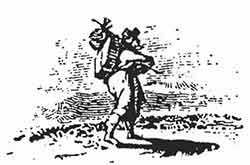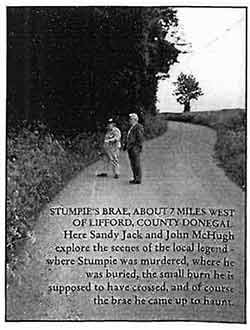The Legend of Stumpie’s Brae
Author: Cecil Frances Alexander
Date: 1998
Source: Ullans: The Magazine for Ulster-Scots, Nummer 6 Simmer 1998

Cecil Frances Alexander
Stumpie’s Brae is outside Lifford in County Donegal. The following well-known poem was written in the Laggan dialect of Ulster-Scots by none other than Cecil Frances Alexander — the great hymn-writer of “All Things Bright and Beautiful”, “There is a Green Hill Far Away”, etc. This copy was sent in “Frae a guidfreen” — Sandy Jack of Strabane.
Heard ye nae tell o’ Stumpies Brae?
Sit doon, sit doon, young freen,
I’ll mak yer flesh tae creep the day,
An’ yer hair tae stan’ on enn.
Young man it’s hard to strive wi’ sin,
An’ the hardest strife o’ a’
Is where the greed o’ gain creeps in,
An’ drives God’s grace awa’.
Oh, it’s quick tae do, but it’s lang tae rue,
When the punishment comes at last.
And we would give the world tae undo,
The deed that’s done an’ past.
Over yon strip of meadow land,
An’ o’er the burnie bright,
Dinna ye mark the fir-trees stand,
Around yon gables white?
I mind it weel in my younger days,
The story yet was rife:
There dwelt within that lonely place,
A fanner an’ his wife.
They sat the-gither all alone,
Ane blessed Autumn night.
When the trees without, and hedge, and stone,
Were white in the sweet moonlight.
The boys an’ girls were gone doon all
A wee till the blacksmith’s wake;
There pass’d ane onby the window small,
An’ guv the door a shake.
The man he up an’ open’d the door —
When he had spoken a bit.
A pedlar man stepped into the floor,
Doon he tumbled the pack he bore,
Right heavy pack was it.
“Gude save us aa,” says the wife, wi’ a smile,
“But yours is a thrivin’ trade.”
“Aye, aye, I’ve wandered mony a mile,
An’ plenty have I made.”
The man sat on by the dull fire flame,
When the pedlar went to rest;
Close till his ear the Devil came,
An’ slipp’d intil his breast.
He look’d at his wife by the dim fire light,
And she was as bad as he —
“Could we no murder thon man the night?”
“Aye, could we, ready,” quo’ she.
He took the pickaxe without a word,
Whence it stood ahint the door;
As he pass’d in, the sleeper stirr’d,
That never waken’d more,
“He’s deid!” says the auld man, comin’ back —
“What o’ the corp, my dear?”
“We’ll bury him snug in his ain bit pack,
Niver ye mind for the loss of the sack,
I’ve ta’en oot a’ the gear.”
“The pack’s owre short by twa guid span.”
“What’ll we do?” quo’ he.
“Och, you’re a doited, unthoughtfu’ man;
We’ll cut him aff at the knee.”
They shortened the corp an’ they pack’d him tight,
Wi’ his legs in a pickle hay;
Over the burn in the sweet moonlight,
They carried him till this brae.
They shovell’d a hole right speedily,
They laid him on his back —
“A right pair are ye,” quo’ the PEDLAR, quo’ he,
Sitting bolt upright in the pack.
“Ye think ye’ve laid me snugly here,
An’ none shall know my station.
But I’ll haunt ye far, an’ I’ll haunt ye near,
Father an’ son, wi’ terror an’ fear
Til the nineteenth generation.”
The twa were sittin’ the verra next night,
When the dog began to cower.
And they knew by the pale blue fire light,
That the Evil One had power.
It had stricken nine, jist nine o’ the clock,
The hour when the man lay dead;
There came to the outer door a knock,
And a heavy, heavy tread.
The old man’s head swam round an’ round,
The woman’s blood ’gan freeze,
For it was not a natural sound,
But like some ane stumpin’ o’er the ground
An the banes o’ his twa bare knees.
And through the door, like a sough of air,
And stump, stump, round the twa.
Wi’ his bloody head, and his knee banes bare
They’d maist ha’e died of awe!
The wife's black locks e’er morn grew white,
They say, as the mountain snaws,
The man was as straight as a staff that night,
But he stooped when the morning rose.
Still, year an’ day, as the clock struck nine,
The hour when they did the sin,
The wee bit dog began to whine,
An’ the gaist came clatterin’ in.
Ae night there was a fearfu’ flood —
Three days the skies had pour’d;
And white wi’ foam, an’ black wi’ mud
The burn in fury roar’d.
Quo’ she, “Gude man, ye need na’ turn,
Sae pale in the dim fire light.
The Stumpie canna cross the burn,
He’ll no’ be here the night.
For it’s o’er the bank, an’ it’s o’er the linn,
And it’s up to the meadow ridge —”
“Aye,” quo’ the Stumpie, hirplin’ in.
And he gie’d the wife a slap on the chin,
“But I cam’ roun’ by the bridge.”
And stump, stump, stump to his plays again,
And o’er the stools and chairs;
Ye’d surely hae thought ten women an’ men,
Were dancing there in pairs.
They sold their gear, and o’er the sea,
To a foreign land they went,
O’er the sea — but wha can flee,
His appointed punishment?
The ship swam o’er the water clear,
Wi’ the help o’ the eastern breeze,
But the verra first sound in guilty fear,
O’er the wide, smooth deck, that fell on their ear,
Was the tappin’ o’ them twa knees.
In the woods of wild America,
Their weary feet they set;
But the Stumpie was there the first, they say,
And he haunted them on to their dying day,
And he follows their children yet,
I haud ye, niver the voice of blood
Call’d from the earth in vain;
And never has crime won worldly good,
But it brought its after-pain.
This is the story of Stumpie’s Brae,
An’ the murderers’ fearfu’ fate.
Young man, yer face is turned that way,
Ye’ll be gangin’ the night that gate.
Ye’ll ken it weel, through the few fir trees,
The house where they wont to dwell,
Gin ye meet ane there, as daylight flees,
Stumpin’ aboot on the banes o’ his knees
It’ll jist be Stumpie himsel’.

Next: Golf in Ulster
Previous: The Twa Tovin Brithers
Contents: Ullans: The Magazine for Ulster-Scots, Nummer 6 Simmer 1998

